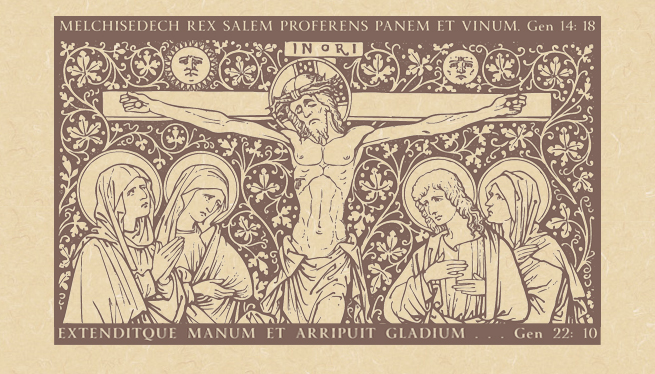Breaking News! I Don't Know Everything.
The Sixth Friday of Lent; and, the Commemoration of Saint John Baptist de la Salle, Priest.*
Lessons from the feria, according to the ordinary form of the Roman Rite:
• Jeremiah 20: 10-13.
• Psalm 18: 2-7.
• John 10: 31-42.
Passion Friday: the Commemoration of the Seven Sorrows of the Blessed Virgin Mary.**
Lessons from the feria, according to the extraordinary form of the Roman Rite:
• Jeremiah 17: 13-18.
• [Gradual] Psalm 34: 20, 22.
• [Tract] Psalm 102: 10.
• John 11: 47-54.
The Sixth Friday of the Great Fast; and, the Feast of Our Venerable Father George, Bishop of Mitylene.***
Lessons for the Presanctified Liturgy, according to the Ruthenian recension of the Byzantine Rite:†
• Genesis 49: 33—50: 26.
• Proverbs 31: 8-31.
FatherVenditti.com
|
 8:22 AM 4/7/2017 — Today, of course, is First Friday, which means that the Blessed Eucharist will be exposed after Holy Communion today; and, it’s also the last day this Lent we will pray the Stations, which, because they will be done in the presence of our Eucharistic Lord, will all be prayed from in front of the altar. Following the Stations, I will return to the confessional until 1:30, at which time we’ll conclude with Benediction. 8:22 AM 4/7/2017 — Today, of course, is First Friday, which means that the Blessed Eucharist will be exposed after Holy Communion today; and, it’s also the last day this Lent we will pray the Stations, which, because they will be done in the presence of our Eucharistic Lord, will all be prayed from in front of the altar. Following the Stations, I will return to the confessional until 1:30, at which time we’ll conclude with Benediction.
Sometimes, when I'm standing here pontificating about the Holy Scriptures, I give the impression that I know everything about everything, and I don't; and, I was reminded of that when I sat down to reflect on today's Holy Mass and noticed that the Missal provides two Collects for today's Mass: one which is the usual run-of-the-mill Collect for the Friday of Passion Week, and one which makes mention of the Blessed Virgin Mary, which is the one that I used today. But I didn't remember why until I got up this morning and prayed Matins and Lauds from the Divine Office.
Pope Saint John XXIII, during his brief pontificate, did a very mild liturgical reform, making some adjustments to the Missal of Saint Pius V in 1962, as most of you know, but he also did a revision of Pope Saint Pius X's Breviary in 1960; and, in his motu proprio, Summorum Pontificum, Pope Benedict gave to Catholic priests the right to not only use that Missal in the celebration of Holy Mass, but also the right to use that 1960 breviary in fulfilling their obligation to pray the Divine Office. And it was in the Office this morning that I was reminded that today, Passion Friday, is observed as the commemoration of the Seven Sorrows of Our Lady. Pope Blessed Paul VI eliminated the commemoration, but the current edition of the Roman Missal does throw us a bone in the form of this alternate Collect which the priest may use, which makes reference to the Mother of God in Her contemplation of the Passion.
The Seven Sorrows—or Dolors—of our Lady are all taken from Holy Scripture: the prophecy of Simeon from Luke 2, the flight into Egypt from Matthew 2, the loss of the Child Jesus in the temple from Luke 3, the meeting of Jesus and Mary on the Way of the Cross, the crucifixion, the taking down of the Body of Jesus from the Cross, and the burial of our Lord. The good Saint Bridget, who spread this devotion, informs us that there are also seven graces the Mother of God promises to those who meditate on Her Seven Sorrows: peace in their family life, understanding of Divine mysteries, consolation in their sufferings, easier abandonment to the holy Will of God, defense against the assaults of the Devil, help at the moment of death, and a special advocacy when standing before the throne of judgment.
As you can see, the Seven Dolors bear close resemblance to the Stations of the Cross;—a few of them are the same—and, because today is the last day this Lent that we will be praying the Stations, by popular demand we will depart from Saint Alphonsus Liguori’s familiar meditations to use those composed by Saint Josemaría Escrivá. And take notice—if you didn't notice it before—that our Lady is, more or less, present in some way in every one of those meditations, not just because of Msgr. Escrivá's profound love for the Mother of God, but because She is there with Her Son in every step He takes up Calvary, just as we should be.
Tomorrow Passion Week comes to a close today, with Holy Week beginning on Sunday, so we can use this day, the traditional commemoration of our Lady of Sorrows, to see our Blessed Mother as the chief example of how to process the Passion of our Lord in our prayers, with the hope—as the words of today's collect pray—that, in contemplating the Passion of Christ, through Her intercession, we may cling more firmly each day to the Father’s only Begotten Son, and come at last to the fullness of His grace.

* Because Lent began on a Wednesday, today is the sixth Friday. Cf. the post here under the heading "Hey, aren't you off by a week?" for an explanation of how the days of the liturgical calendar are rendered on this site as opposed to how they are designated in the Roman Missal.
In the ordinary form during Lent, memorials automatically become commemorations, the observance of which is optional. If observed, only the Collect of the saint is used, with everything else taken from the feria. In the extraordinary form, third class feasts also become commemorations, with the commemoration made by an additional Collect, Secret and Postcommunion added to those of the feria. In both forms, the color of the season is worn.
Jean-Baptiste de la Salle (d. 1719), a secular priest of the Diocese of Rheims and member of the Cathedral Chapter, gave away his fortune to become a priest and, in 1680, founded the Brothers of the Christian Schools, today numbering some 4,975 members. He authored the Conduct of Schools, which guided the establishment and administration of Catholic schools for hundres of years, and is regarded as the Patron Saint of teachers.
** In point of fact, the Seven Sorrows of Mary are commemorated liturgically three times in the extraordinary form: on the Friday of Passion Week, on March 28th, and again on September 15th.
*** Because the Great Fast began on a Monday, today is the sixth Friday.
George of Mitylene died during the iconoclastic persecution.
† Cf. the second footnote to the post here for an explanation of weekday services in the Byzantine Tradition during the Great Fast.
|

